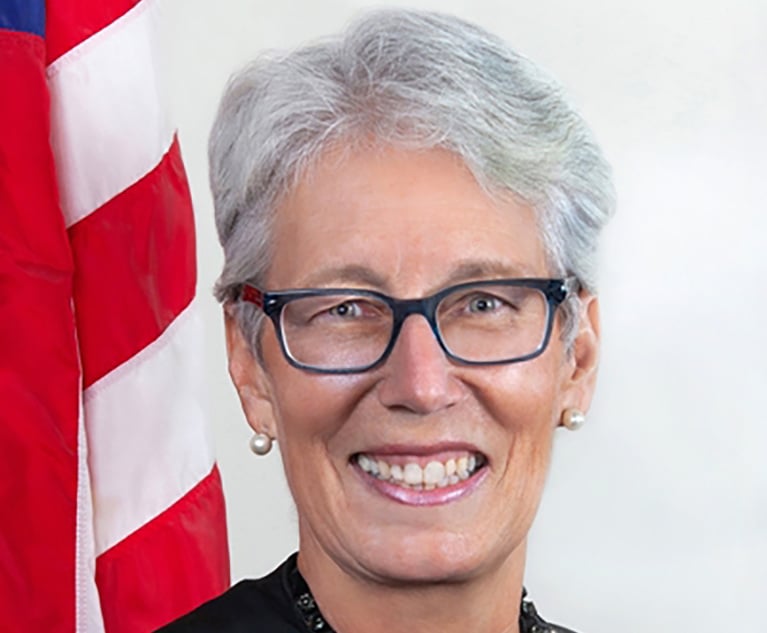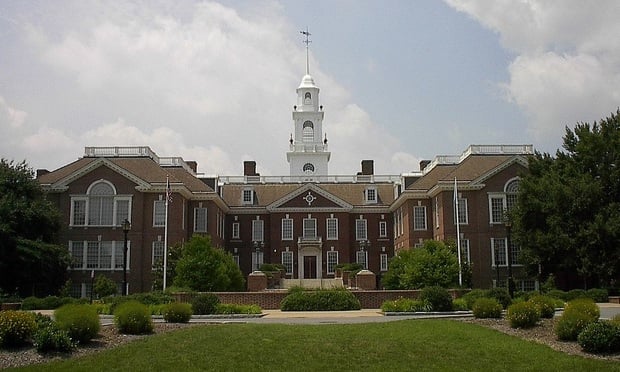 Dover City Hall in Dover, Delaware. Photo: Nagel Photography/Shutterstock.com
Dover City Hall in Dover, Delaware. Photo: Nagel Photography/Shutterstock.comAs Curfews Across Nation End, Attorney, ACLU Claim Dover's Violates Civil Liberties
Criminal defense attorney Adam Windett wrote a letter to Mayor Robin R. Christiansen on Thursday urging him to end the indefinite nightly curfew, and a similar letter was sent Friday by the ACLU of Delaware.
June 12, 2020 at 02:54 PM
4 minute read
The original version of this story was published on Delaware Law Weekly
Nearly two weeks after it was announced, Dover's curfew is being questioned by critics who say it's unwarranted and risks infringement on First and Fourth Amendment rights.
Criminal defense attorney Adam Windett wrote a letter to Mayor Robin R. Christiansen on Thursday urging him to end the indefinite nightly curfew, and a similar letter was sent Friday by the American Civil Liberties Union of Delaware.
Christiansen announced May 31 that a curfew from 9 p.m. to 6 a.m. would be put in place until further notice. As of Friday afternoon, the curfew was still in effect, prohibiting people from being on public streets or in public places during those hours unless there for work. Christiansen did not respond for comment on the curfew Friday.
Windett wrote there has not been proof in recent weeks of a level of imminent danger in Dover that would justify the citywide curfew. He said Friday a curfew isn't warranted in the city when larger cities across the country have ended curfews that were implemented at the end of May and beginning of June in response to nationwide protests.
The ACLU letter argued the curfew is broader than any specific interest and the city hasn't seen levels of violence or imminent danger that would warrant it staying in place as is. The letter, signed by ACLU of Delaware Executive Director Mike Brickner and Legal and Policy Director Karen Lantz, cited cases in which courts determined it's generally accepted that the proper way to deal with unlawful conduct that might be related to First Amendment activity is to punish it after it happens, "rather than to prevent the First Amendment activity from occurring in order to obviate the possible unlawful conduct."
Section 38-83 of the Dover Code of Ordinances lists six specific actions, including establishing a curfew and halting traffic, that Christiansen could take under a state of emergency, but that code also states he may "issue such other regulations as are deemed necessary" and "do all acts necessary to enforce such orders."
Windett said while Christiansen's executive declaration stated the curfew is voluntary and he hasn't heard of anyone in Dover being arrested or stopped on the street by law enforcement past curfew, keeping the curfew in place could set precedent in the city that could infringe on citizens' rights, potentially creating a general warrant that would allow police to stop people who otherwise would be protected under the Fourth Amendment.
"Any time there's an uptick of crime in the city, the mayor could say, 'this is a state of emergency,' and that would then give law enforcement a tool to stop people without justification," Windett said. "So my concern is the overly broad use of a curfew as a tool to effectuate stops where they otherwise wouldn't be warranted under the Fourth Amendment."
To date, he said, people have largely complied with the curfew, with the primary effect being businesses closing earlier than usual.
Multiple protests have been held in Dover in recent weeks, with Delaware State Police reporting 22 people were taken into custody Tuesday during a protest that about 40 people began in Dover before moving to Camden. Twenty of those people were arrested for charges that includes disorderly conduct by obstructing traffic, threatening behavior and refusal to disperse. Those protests were reported to have taken place prior to curfew.
The ACLU letter said the curfew is a violation of the First Amendment and cited federal cases that held that governments' authority to restrict speech on public streets and sidewalks is limited, and such restrictions can typically only be enforced if they "are content-neutral, are narrowly tailored to serve a significant government interest, and leave open ample alternative channels of communication," specifications that Brickner and Lantz wrote are not met by Dover's current curfew.
Windett said he wrote his letter as a concerned citizen and attorney representing people in criminal cases, not as an attorney threatening litigation against the city.
"I'd prefer that it not get to that. I'd prefer that people's rights not be violated and not have impact that would require filing a lawsuit," he said.
This content has been archived. It is available through our partners, LexisNexis® and Bloomberg Law.
To view this content, please continue to their sites.
Not a Lexis Subscriber?
Subscribe Now
Not a Bloomberg Law Subscriber?
Subscribe Now
NOT FOR REPRINT
© 2024 ALM Global, LLC, All Rights Reserved. Request academic re-use from www.copyright.com. All other uses, submit a request to [email protected]. For more information visit Asset & Logo Licensing.
You Might Like
View All

Jurden Announces 2025 Retirement, Capping 24 Years on Superior Court
3 minute read

Rare Opposition to Proposed Del. Corporate Law Changes Is Voiced to House Committee
5 minute readTrending Stories
Who Got The Work
Michael G. Bongiorno, Andrew Scott Dulberg and Elizabeth E. Driscoll from Wilmer Cutler Pickering Hale and Dorr have stepped in to represent Symbotic Inc., an A.I.-enabled technology platform that focuses on increasing supply chain efficiency, and other defendants in a pending shareholder derivative lawsuit. The case, filed Oct. 2 in Massachusetts District Court by the Brown Law Firm on behalf of Stephen Austen, accuses certain officers and directors of misleading investors in regard to Symbotic's potential for margin growth by failing to disclose that the company was not equipped to timely deploy its systems or manage expenses through project delays. The case, assigned to U.S. District Judge Nathaniel M. Gorton, is 1:24-cv-12522, Austen v. Cohen et al.
Who Got The Work
Edmund Polubinski and Marie Killmond of Davis Polk & Wardwell have entered appearances for data platform software development company MongoDB and other defendants in a pending shareholder derivative lawsuit. The action, filed Oct. 7 in New York Southern District Court by the Brown Law Firm, accuses the company's directors and/or officers of falsely expressing confidence in the company’s restructuring of its sales incentive plan and downplaying the severity of decreases in its upfront commitments. The case is 1:24-cv-07594, Roy v. Ittycheria et al.
Who Got The Work
Amy O. Bruchs and Kurt F. Ellison of Michael Best & Friedrich have entered appearances for Epic Systems Corp. in a pending employment discrimination lawsuit. The suit was filed Sept. 7 in Wisconsin Western District Court by Levine Eisberner LLC and Siri & Glimstad on behalf of a project manager who claims that he was wrongfully terminated after applying for a religious exemption to the defendant's COVID-19 vaccine mandate. The case, assigned to U.S. Magistrate Judge Anita Marie Boor, is 3:24-cv-00630, Secker, Nathan v. Epic Systems Corporation.
Who Got The Work
David X. Sullivan, Thomas J. Finn and Gregory A. Hall from McCarter & English have entered appearances for Sunrun Installation Services in a pending civil rights lawsuit. The complaint was filed Sept. 4 in Connecticut District Court by attorney Robert M. Berke on behalf of former employee George Edward Steins, who was arrested and charged with employing an unregistered home improvement salesperson. The complaint alleges that had Sunrun informed the Connecticut Department of Consumer Protection that the plaintiff's employment had ended in 2017 and that he no longer held Sunrun's home improvement contractor license, he would not have been hit with charges, which were dismissed in May 2024. The case, assigned to U.S. District Judge Jeffrey A. Meyer, is 3:24-cv-01423, Steins v. Sunrun, Inc. et al.
Who Got The Work
Greenberg Traurig shareholder Joshua L. Raskin has entered an appearance for boohoo.com UK Ltd. in a pending patent infringement lawsuit. The suit, filed Sept. 3 in Texas Eastern District Court by Rozier Hardt McDonough on behalf of Alto Dynamics, asserts five patents related to an online shopping platform. The case, assigned to U.S. District Judge Rodney Gilstrap, is 2:24-cv-00719, Alto Dynamics, LLC v. boohoo.com UK Limited.
Featured Firms
Law Offices of Gary Martin Hays & Associates, P.C.
(470) 294-1674
Law Offices of Mark E. Salomone
(857) 444-6468
Smith & Hassler
(713) 739-1250






